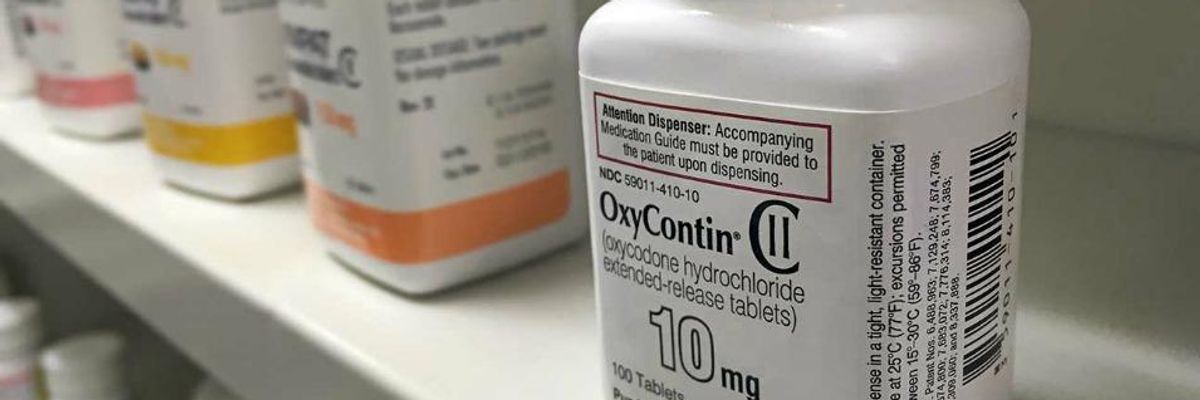
A newly-uncovered DOJ report details the extensive knowledge Purdue Pharma, maker of OxyContin, had about patients' abuse of the drug in the years after it was released. (Photo: VCU CNS/Flickr/cc)
'Dark and Disturbing' DOJ Report Shows Big Pharma Knew of Opioid Abuse After Releasing Popular Painkiller
Within a year of Purdue Pharma releasing OxyContin, internal memos mentioned concerns over patients abusing the painkiller and doctors acting as drug pushers
As lawsuits mount against the pharmaceutical company Purdue Pharma over its knowledge that one of its best-selling drugs was addictive and dangerous, a newly- uncovered Justice Department report shows that the multi-billion dollar corporation also knew that patients were abusing OxyContin shortly after the drug's release.
Almost immediately after releasing OxyContin in 1996, Purdue Pharma received reports that patients were crushing and snorting the drug and stealing it from pharmacies, and that some doctors were beginning to sell prescriptions for the highly addictive painkiller, which is chemically similar to heroin.
According to the New York Times' report on the DOJ document, Purdue's general counsel wrote in early 1999, "We have in fact picked up references to abuse of our opioid products on the internet."
That same year, an OxyContin sales representative wrote in an email, "I feel like we have a credibility problem with our product," after a doctor in Florida was arrested for illegally prescribing the drug. Sales representatives were discouraged by Purdue from raising concerns about abuse, with one saying his manager told him that "his job was to sell drugs, not to determine if a 'doctor was a drug pusher.'"
Purdue has claimed it did not learn of growing opioid abuse until 2000, when it was alerted by a U.S. attorney in Maine.
But by June 2000, the company's vice president of marketing wrote that he had long been receiving news of OxyContin abuse "all the time and from everywhere."
"Some pharmacies would not even stock MS Contin for fear they would be robbed," wrote the vice president. "In Wisconsin, Minnesota, and Oklahoma, we had physicians indicted for prescribing too much MS Contin."
The formerly confidential DOJ report came out of the same four-year investigation that led prosecutors to push for the indictments of three Purdue officials on felony fraud charges, when they discovered that the company was aggressively marketing OxyContin as safe for long-term use even though it knew the drug was addictive.
The George W. Bush administration opted to settle the case instead, with the executives and the company paying $634.5 million in fines in 2007.
Since then, Purdue Pharma has been sued by more than a dozen states for its deceptive marketing practices, while overdose deaths from OxyContin and other opioids have continued to rise steadily.
An Urgent Message From Our Co-Founder
Dear Common Dreams reader, The U.S. is on a fast track to authoritarianism like nothing I've ever seen. Meanwhile, corporate news outlets are utterly capitulating to Trump, twisting their coverage to avoid drawing his ire while lining up to stuff cash in his pockets. That's why I believe that Common Dreams is doing the best and most consequential reporting that we've ever done. Our small but mighty team is a progressive reporting powerhouse, covering the news every day that the corporate media never will. Our mission has always been simple: To inform. To inspire. And to ignite change for the common good. Now here's the key piece that I want all our readers to understand: None of this would be possible without your financial support. That's not just some fundraising cliche. It's the absolute and literal truth. We don't accept corporate advertising and never will. We don't have a paywall because we don't think people should be blocked from critical news based on their ability to pay. Everything we do is funded by the donations of readers like you. Will you donate now to help power the nonprofit, independent reporting of Common Dreams? Thank you for being a vital member of our community. Together, we can keep independent journalism alive when it’s needed most. - Craig Brown, Co-founder |
As lawsuits mount against the pharmaceutical company Purdue Pharma over its knowledge that one of its best-selling drugs was addictive and dangerous, a newly- uncovered Justice Department report shows that the multi-billion dollar corporation also knew that patients were abusing OxyContin shortly after the drug's release.
Almost immediately after releasing OxyContin in 1996, Purdue Pharma received reports that patients were crushing and snorting the drug and stealing it from pharmacies, and that some doctors were beginning to sell prescriptions for the highly addictive painkiller, which is chemically similar to heroin.
According to the New York Times' report on the DOJ document, Purdue's general counsel wrote in early 1999, "We have in fact picked up references to abuse of our opioid products on the internet."
That same year, an OxyContin sales representative wrote in an email, "I feel like we have a credibility problem with our product," after a doctor in Florida was arrested for illegally prescribing the drug. Sales representatives were discouraged by Purdue from raising concerns about abuse, with one saying his manager told him that "his job was to sell drugs, not to determine if a 'doctor was a drug pusher.'"
Purdue has claimed it did not learn of growing opioid abuse until 2000, when it was alerted by a U.S. attorney in Maine.
But by June 2000, the company's vice president of marketing wrote that he had long been receiving news of OxyContin abuse "all the time and from everywhere."
"Some pharmacies would not even stock MS Contin for fear they would be robbed," wrote the vice president. "In Wisconsin, Minnesota, and Oklahoma, we had physicians indicted for prescribing too much MS Contin."
The formerly confidential DOJ report came out of the same four-year investigation that led prosecutors to push for the indictments of three Purdue officials on felony fraud charges, when they discovered that the company was aggressively marketing OxyContin as safe for long-term use even though it knew the drug was addictive.
The George W. Bush administration opted to settle the case instead, with the executives and the company paying $634.5 million in fines in 2007.
Since then, Purdue Pharma has been sued by more than a dozen states for its deceptive marketing practices, while overdose deaths from OxyContin and other opioids have continued to rise steadily.
As lawsuits mount against the pharmaceutical company Purdue Pharma over its knowledge that one of its best-selling drugs was addictive and dangerous, a newly- uncovered Justice Department report shows that the multi-billion dollar corporation also knew that patients were abusing OxyContin shortly after the drug's release.
Almost immediately after releasing OxyContin in 1996, Purdue Pharma received reports that patients were crushing and snorting the drug and stealing it from pharmacies, and that some doctors were beginning to sell prescriptions for the highly addictive painkiller, which is chemically similar to heroin.
According to the New York Times' report on the DOJ document, Purdue's general counsel wrote in early 1999, "We have in fact picked up references to abuse of our opioid products on the internet."
That same year, an OxyContin sales representative wrote in an email, "I feel like we have a credibility problem with our product," after a doctor in Florida was arrested for illegally prescribing the drug. Sales representatives were discouraged by Purdue from raising concerns about abuse, with one saying his manager told him that "his job was to sell drugs, not to determine if a 'doctor was a drug pusher.'"
Purdue has claimed it did not learn of growing opioid abuse until 2000, when it was alerted by a U.S. attorney in Maine.
But by June 2000, the company's vice president of marketing wrote that he had long been receiving news of OxyContin abuse "all the time and from everywhere."
"Some pharmacies would not even stock MS Contin for fear they would be robbed," wrote the vice president. "In Wisconsin, Minnesota, and Oklahoma, we had physicians indicted for prescribing too much MS Contin."
The formerly confidential DOJ report came out of the same four-year investigation that led prosecutors to push for the indictments of three Purdue officials on felony fraud charges, when they discovered that the company was aggressively marketing OxyContin as safe for long-term use even though it knew the drug was addictive.
The George W. Bush administration opted to settle the case instead, with the executives and the company paying $634.5 million in fines in 2007.
Since then, Purdue Pharma has been sued by more than a dozen states for its deceptive marketing practices, while overdose deaths from OxyContin and other opioids have continued to rise steadily.

